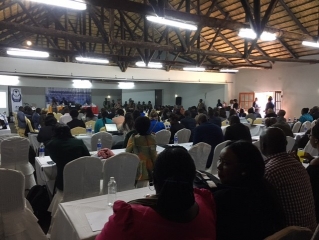You are here
Regional Conference in Africa Allows Social Workers to Share Innovative Approaches for Working with Families & Communities

 Many people are not aware of the myriad of issues that social workers and others in the social service sector help individuals and communities to address. During the Social Work, Education and Social Development 2017 Conference more than 200 practitioners, government representatives, researchers, students, association members, and NGO, CSO and FBO staff came together to discuss innovative national, regional and global evidence-based approaches in social work. Held June 25-28 in Livingstone, Zambia, the conference was jointly hosted by the Association of Schools of Social Work in Africa (ASSWA), the International Federation of Social Workers (IFSW, Africa), and Social Workers’ Association of Zambia (SWAZ).
Many people are not aware of the myriad of issues that social workers and others in the social service sector help individuals and communities to address. During the Social Work, Education and Social Development 2017 Conference more than 200 practitioners, government representatives, researchers, students, association members, and NGO, CSO and FBO staff came together to discuss innovative national, regional and global evidence-based approaches in social work. Held June 25-28 in Livingstone, Zambia, the conference was jointly hosted by the Association of Schools of Social Work in Africa (ASSWA), the International Federation of Social Workers (IFSW, Africa), and Social Workers’ Association of Zambia (SWAZ).
Presentations encouraged dialogue on approaches to providing services to address HIV/AIDS, childhood marriage, gender-based violence, social protection, child protection, gender equality, family-based care, environmental sustainability and protection, and other issues affecting vulnerable populations that require a well-planned, well-developed and well-supported social service workforce.
The conference is one of several regional conferences organized with support of IFSW annually, leading up to the IFSW Global Conference in June 2018. During opening remarks, Ruth Stark, President of IFSW, challenged attendees to think of their role globally. “Research shows that for every $1 spent on social services, the return to the local economy is $3. We have an incredible contribution to make to our communities and global communities. Our profession is a borderless profession.”
To emphasize the global nature of the profession, the Global Social Service Workforce Alliance supported the conference and coordinated a panel session on ‘Identifying effective social service workforce strengthening and case management in initiatives in Zambia and beyond.’ Presenters from Zambia Rising Project at Save the Children, the Ministry of Community Development and Social Services, Christian Alliance for Children in Zambia, Expanded Church Response and Luapula Foundation joined the Alliance in presenting on roles and responsibilities in case management, embedding case management into communities and building consensus in uses of case management. Participants also discussed alternative care case management systems as a component of the broad integrated case management system within the child and family welfare system.
I took part in a panel presentation on how to advocate for a stronger workforce. During the panel I shared the new Global Advocacy Toolkit for the Social Service Workforce that the Alliance developed with WithoutViolence. The toolkit provides evidence-based tools for developing messages, determining key audiences, creating outreach plans and monitoring success of efforts to advocate to policy-makers and stakeholders for greater funding and support for the social service workforce.
I also attended several of the more than 100 abstract presentations. Some of the highlights for me included learning from Genious Musokotwane from Girls Not Brides who reviewed how social workers in Zambia are also involved in providing safe spaces for girls freed from childhood marriages to be able to complete their schooling through grade 12. The organization is trying to work with communities to overcome religious and cultural beliefs that allow girls to marry as soon as they reach puberty so that more girls can finish school and delay pregnancies. In 2016, 16,000 girls nationwide dropped out of school due to teenage pregnancy; annually 15 million girls are married before they turn 18.[1]
Representatives from social work councils in South Africa, Namibia and Zimbabwe provided detail on how the councils were established, their role in supporting the profession and the sustainability of both the council and association through dues and fees related to registration and licensing. As the only three countries among the 54 countries in Africa with a council and association, there was great interest from other participants to learn how to begin the process in their country. “Contribute your voice as practitioners through involvement in your national association and give visibility and credibility to the profession, learn from each other and validate the work of others,” stated Noel Muridzo, IFSW Africa President.
In another session on social protection and legal frameworks for policy development with Southern African Development Community (SADC), examples from Kenya, Zambia and Mozambique were highlighted. “SADC leads the continent in range, reach and number of social protection programs,” said Vince Chipatuka, Southern African Social Protection Experts Network Coordinator. The session sought to inform social workers and development practitioners on current developments within the region in order to enhance policy interventions at the national level.
As a network, the Alliance fosters the exchange of ideas, tools and best practices across countries. For many at the conference, this was the first such opportunity to learn from others working in the same field in another country. More than 20 conference attendees became members of the Alliance to continue this discourse with colleagues globally.
The Alliance’s participation in the conference was supported by the GHR Foundation’s Children in Families project. The GHR Foundation is supporting the Alliance and other organizations working in Zambia that are helping to strengthen the workforce to support vulnerable families and provide family-based care for children.
